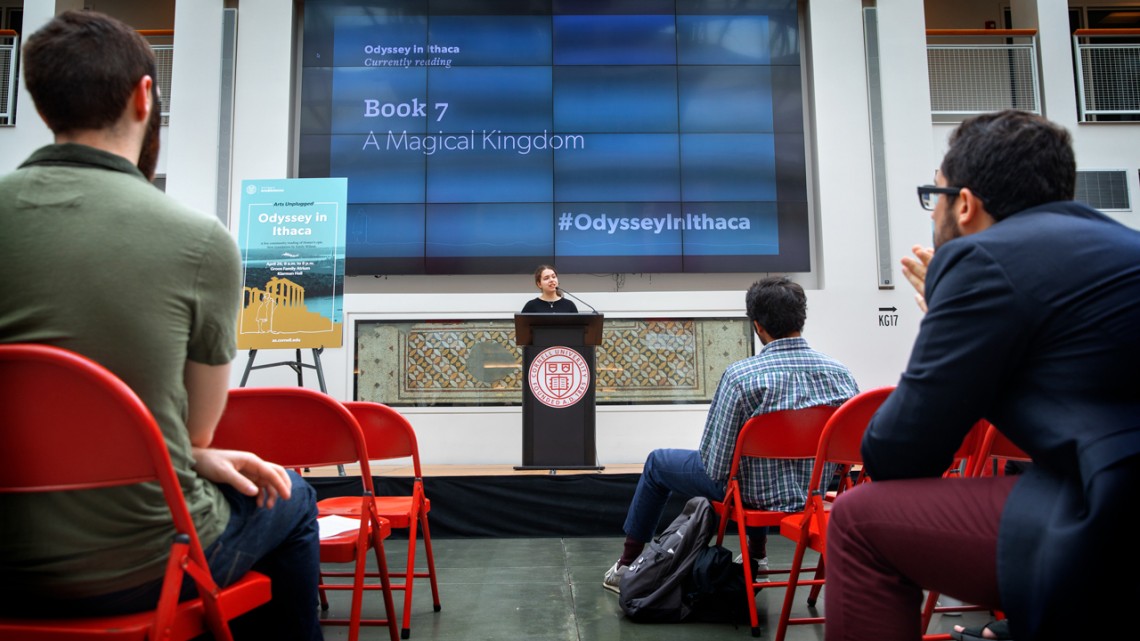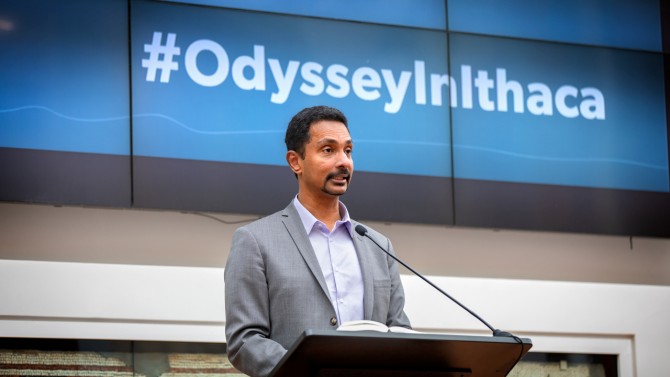
Alexa Saylan ’22 reads from book seven of the “Odyssey” April 26 in Klarman Hall.
‘Odyssey in Ithaca’ captivates during community read
By Kathy Hovis
From tales of sinking ships to murderous fights to bedroom shenanigans, a cast of 75 readers told the story of Homer’s “Odyssey” during a daylong event April 26 in Klarman Hall. It was the first event in the College of Arts and Sciences’ new “Arts Unplugged” series.
The daylong reading, spearheaded by Athena Kirk, assistant professor of classics, featured speakers from local colleges and the community, including state Assemblywoman Barbara Lifton, D-125th, as well as special audio segments from Annie Lewandowski, senior lecturer in music.
“Today I think everyone experienced the ‘Odyssey’ and the Klarman space as they had not before, through the variegated tapestry of the readers’ beautiful voices. To listen together as the poem filled the atrium was both collectively and individually moving,” Kirk said. “Though so many of us pass through here daily, it’s seldom we all share in one activity – and yet each of us also heard our own version of the text.”
“The Odyssey in Ithaca” began at 8 a.m. with a group of eight students and faculty reading the first 10 lines of the epic poem in Greek. From there, readers used a new translation by Emily Wilson – the first female translator of the work into English verse – and various forms of dramatic flair to tell the story of Odysseus’ 10-year journey home to Ithaka after the fall of Troy.
“This epic was originally a spoken work, and there’s really no other opportunity to have it told to you in the original medium of communication,” said Alexa Saylan ’22, who showed up for the Greek reading at 8 a.m. and came back to read from Book 7, “A Magical Kingdom.”
“An event like this shows that our cultural treasures are to be shared with everyone,” Saylan said, “that these texts that some people consider snooty or prestigious are really accessible for everyone to enjoy with common themes that resonate with people. We know Odysseus as a clever and witty hero, but the passage I read really shows his vulnerability. Even though he’s compared to gods and such, he’s really just a person suffering who wants to go back home.”
Saylan’s passage came right after the one read by Ray Jayawardhana, the Harold Tanner Dean of Arts and Sciences. Jayawardhana launched “Arts Unplugged” to highlight the centrality of the liberal arts and sciences in the broader public sphere.
“This series showcases the extraordinary creative and scholarly work of our faculty and students,” he said. “Having the ‘Odyssey’ reading as our first event was a telling example of the community coming together for intellectual engagement and inspiration.”
Ella Haselswerdt, a postdoctoral fellow in classics who helped organize the event, spent the day in the atrium helping corral readers and answer questions.
“The rhythms of a normal day in the bustling Temple of Zeus were folded into the dynamics of the performance,” she said, “showing that this monumental ancient text is not incompatible with modern, quotidian experience – but rather they can interact and elevate one another.”
In between student and faculty readers, many campus and community members took part in the event, including Lifton, Cornell Police Chief David Honan and Hangar Theatre Artistic Director Michael Barakiva.
Readers came from all backgrounds, departments and majors.
“I was happy to participate in this effort, which highlighted the importance of the humanities and the timeless nature of works of literature and art,” said Provost Michael Kotlikoff, who read from Book 8, “Songs of a Poet.” “I also want to thank Athena [Kirk] for establishing a fun event that brought together so many areas of the campus and community.”
David Mimno, assistant professor of information science who as an undergraduate majored in Greek and Latin as well as computer science, read part of Book 12, “Difficult Choices,” which includes a run-in with a group of Sirens. During Mimno’s reading, Lewandowski played a series of whale sounds to offer listeners another audio experience of the story.
“Being up there as a reader, you can see whether or not people are engaged, and that’s a great perspective on Homer,” Mimno said. “He had to keep it moving; it had to be compelling and interesting.”
Daniel Gallagher, the Ralph and Jeanne Kanders Associate Professor of the Practice in Latin, had a particularly dramatic turn at the podium with his section of Chapter 9, “A Pirate in a Shepherd’s Cave.”
“I thought it was fantastic because so many people were passing through [Klarman Hall] with no idea that this was going on, and many of them decided to sit down and listen,” he said. “That’s the whole idea. You might not know what’s going on, but if you stay for 5 or 10 minutes, you can really get caught up in the story.”
Gallagher said he hopes some listeners might be interested enough to sit down and read the rest of the story. He was also impressed to see people hanging out in the atrium for much of the day, books in hand, following along. Gallagher even brought his kids – Bernard, 2, and Brigid, 1 – to listen to the story.
“They knew this was something important and different,” he said. “There’s something magical about just sitting there for a while and absorbing what’s going on.”
Kirk said she received many suggestions for similar events.
“I am so thrilled by everyone’s energy and enthusiasm surrounding the day, and with their ideas of for more texts to read,” she said. “I hope we can continue to engage with each other, and with literature, in this very special way.”
View a gallery of photos on the College of Arts and Sciences’ Facebook page.
Kathy Hovis is a writer for the College of Arts and Sciences.
Media Contact
Get Cornell news delivered right to your inbox.
Subscribe

